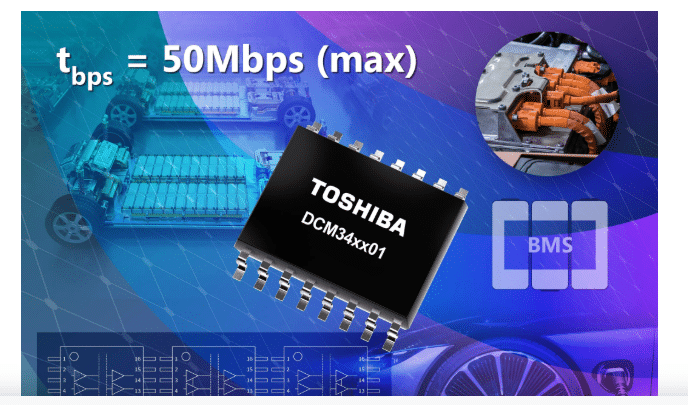Designed for EVs, HEVs, and high-voltage systems, new series offers superior isolation, noise immunity, and flexible configurations.

Toshiba Electronics Europe GmbH has introduced a new lineup of four-channel digital isolators optimized for modern automotive applications. With the automotive industry shifting toward zonal architectures and high-voltage designs, traditional optocouplers no longer meet next-generation vehicles’ performance and reliability demands. Toshiba’s DCM34xx0 series responds to this challenge with a robust, high-speed, and high-reliability isolation solution.
The family includes ten AEC-Q100 qualified models, all designed to withstand the harsh electrical environments found in hybrid-electric (HEV) and battery-electric vehicles (EV). These isolators are ideal for systems such as on-board chargers (OBCs), battery management systems (BMS), and other safety-critical automotive electronics.
A standout example from the series is the DCM340C01, a quad-channel digital isolator that utilizes the company’s proprietary magnetic coupling technology to achieve an impressive isolation voltage. With a typical common-mode transient immunity (CMTI), the device ensures fast and stable signal transmission even in high-noise environments. Maintains low output levels when powered off for enhanced fail-safe behavior.
The key specifications are:
- Isolation Voltage: 5,000 Vrms
- CMTI: 100kV/μs (typical) for strong noise immunity
- Data Rate: Supports high-speed communication up to 50Mbps
- Supply Voltage: Operates from 3.0V to 5.5V
The series offers flexible channel configurations, including four forward channels, three forward with one reverse, and two forward with two reverse channels, catering to a wide range of design requirements. Low pulse-width distortion of just 0.8ns (typ.) makes these devices well-suited for high-speed digital communication interfaces, including SPI-based I/O systems.
Each isolator comes in a compact 16-pin SOIC-16W package, with an operating temperature range from -40°C to +125°C, ensuring reliable performance in demanding environments. Beyond automotive, these isolators are also applicable in industrial and communication systems where signal integrity and isolation are critical.








